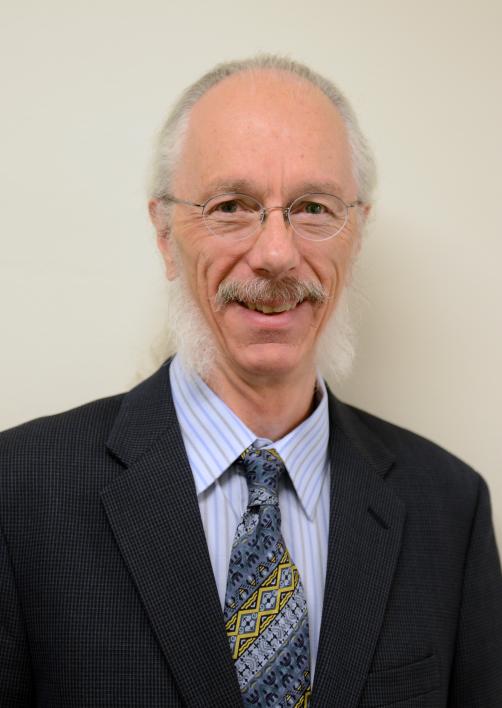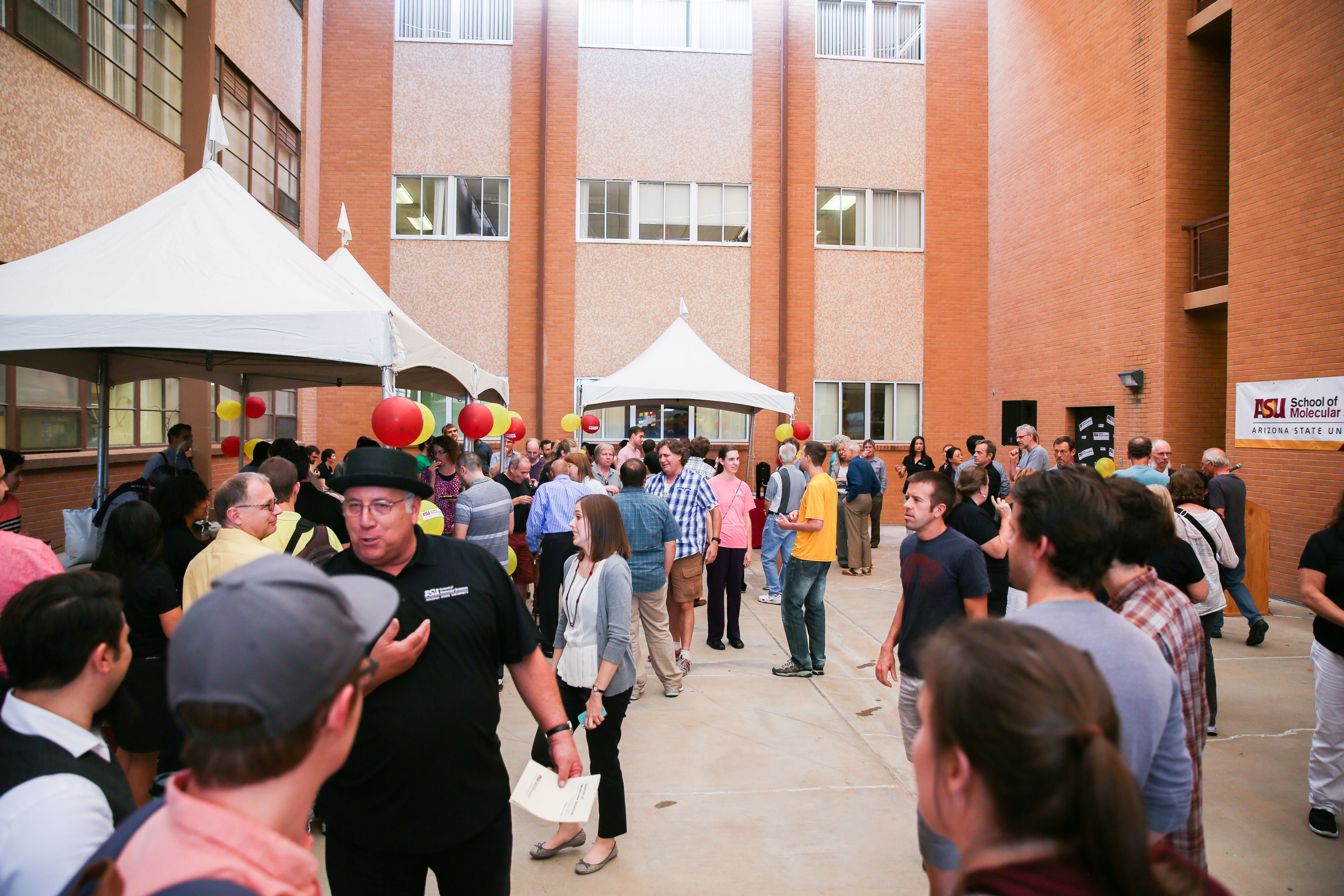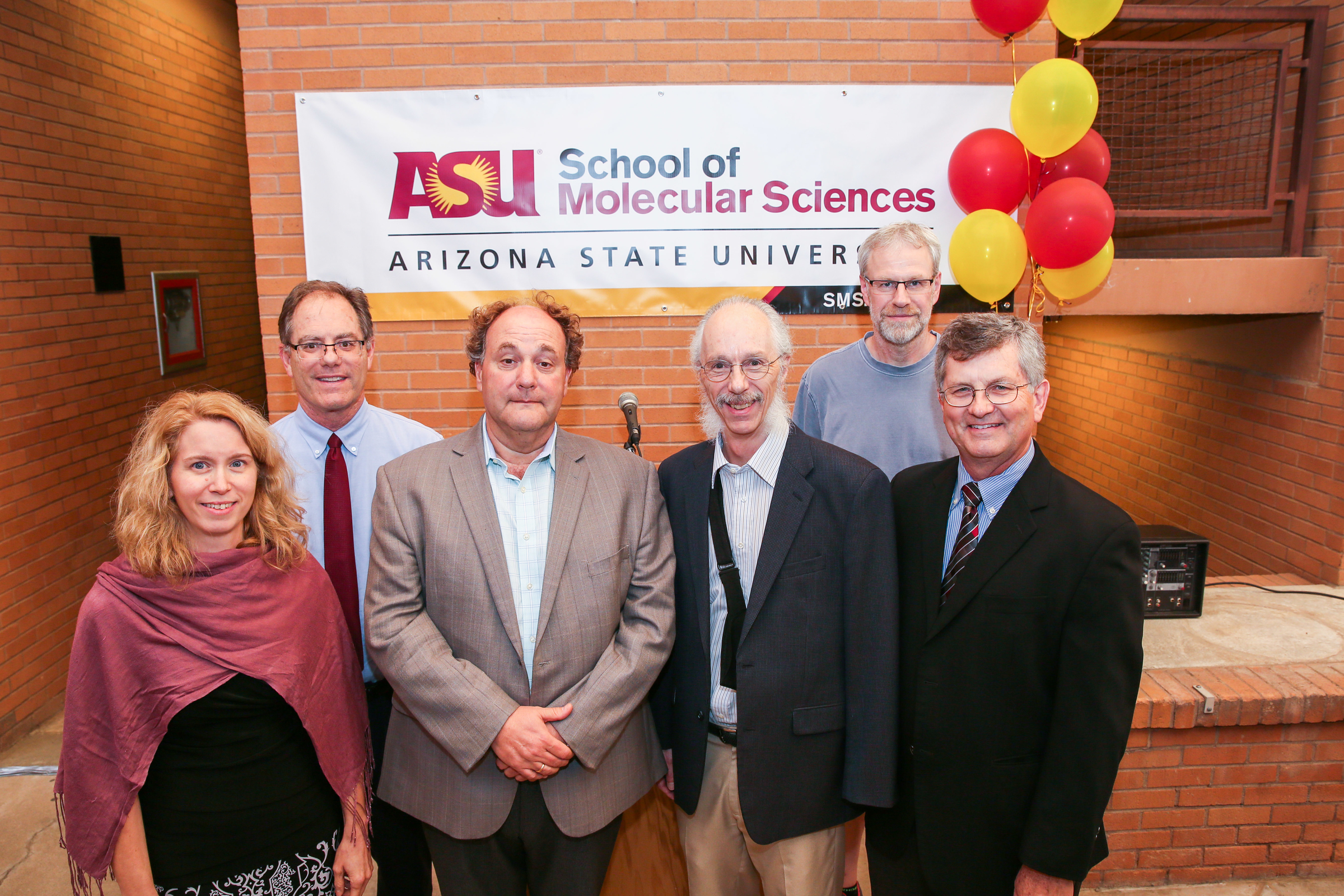ASU’s new School of Molecular Sciences gears up for future societal challenges

Ian Gould, President’s Professor in the School of Molecular Sciences (right, with graduate student Ara Austin in front of the new school's banner), said research at the new school is being refocused around contemporary societal themes, such as energy and sustainability. Photo by Rachel Nemeh/State Press
With technical advances coming at a quickening pace and societal challenges becoming more complex, Arizona State University’s department of chemistry and biochemistry is transforming into the School of Molecular Sciences to better reflect its mission and gear up for the future.
The new school designation is in recognition of the changing roles of chemistry and biochemistry — fields that are developing rapidly and filling many new and critical uses.
A celebration event for the new school’s launch will be held at 4 p.m. Oct. 21 in the atrium between the C and D wings of the Physical Sciences building on the Tempe campus.
At the heart of the School of Molecular Sciences will be an expansion of the traditional disciplines of chemistry and biochemistry into a broader context of contemporary education and research.
For example, ASU’s faculty and students already use chemistry and biochemistry to understand and diagnose diseases and improve health, to develop new ways of converting and storing energy and to design and build new multifunctional materials, according to Daniel Buttry, director of the new school.
“Progress in each of these areas requires a deep understanding of molecular structure, properties and synthesis, but the research goals are trending away from problems in discipline-based chemistry and biochemistry and towards larger, mission-based societal problems,” Buttry said. “These societal ‘grand challenges’ often require faculty and students to work in larger, interdisciplinary groups that extend beyond the traditional boundaries of chemistry and biochemistry.”
According to Ian Gould, President’s Professor in the School of Molecular Sciences, the work of faculty and students reflect the ways in which chemistry and biochemistry as disciplines are maturing and how future progress in these fields will be accomplished.
"The new school recognizes that when our students graduate and become independent scientists, they will be required to work on problems that cannot be solved by individual scientists, and to work in teams in which traditional disciplinary labels have little meaning,” Gould said. “We need to train our students to be successful in the post-disciplinary scientific world."
For these reasons, he said, research at the new School of Molecular Sciences is being refocused around contemporary societal themes, including:
• Energy and sustainability
• Medicine and health
• Materials nanoscience
• Geologic and biospheric sciences
• Structure, function and dynamics
• Frontiers of chemical measurement
• Fundamental molecular science
“Organizing around these themes will encourage new research initiatives and will focus our faculty and students on real-world challenges, where progress will only be made with an understanding of how macroscopic phenomena are controlled by processes at the molecular, atomic and electronic scales,” said Buttry (pictured left). “An example of this evolution is the change of research focus for several of our faculty from understanding the nitty-gritty of photosynthesis reaction pathways to applying that knowledge to design new energy sources based on light absorption.”
The new groups working in these areas will develop new seminar series, discussion groups and courses, and the reorganization will more accurately reflect the current intellectual endeavors of ASU faculty and students.
While the primary goal of the new school is to properly align research areas with faculty interest and contemporary problems, longer-term goals are to investigate the educational needs relevant into the 22nd century.
Gould said the school will offer potential undergraduate students new research opportunities in contemporary science, and new degree offerings are anticipated in the next few years that connect to emerging career opportunities. The school also will offer potential graduate students an immersive experience in interdisciplinary research teams throughout their graduate experience, and provide the training they need to be successful future independent scientists.
”Our overarching goal is to produce graduates with the cutting-edge skills needed to do impactful work in large interdisciplinary groups and who can contribute molecular-level thinking to address pressing societal needs,” Buttry said.
Above and below: Faculty, students and staff gather for a celebration of the new School of Molecular Sciences on the Tempe campus Oct. 21. Photos by Deanna Dent/ASU Now
More Science and technology
From wanna-be high school math teacher to Regents Professor
It’s a bit difficult to describe the work Stephanie Forrest does as director of Arizona State University’s Biodesign Center for…
Regents Professor recognized as pioneer in educational technology
Reading can transport people around the world — and back and forth in time.That’s what Danielle McNamara has helped tens of…

Professor’s expertise in technology transfer leads to top faculty honor
Universities spend billions of dollars on research, and the process of transforming that work into goods and services for the…


